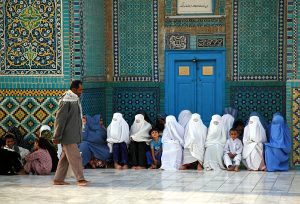Denying Afghanistan’s girls their rights is the basis on which the Taliban is building a future generation of fighters. The false distinction between promoting human rights and fighting terrorism has hampered efforts to stop this growing threat. Young Afghan women are watching their options for education and employment evaporate. They are being told their life’s work is the rearing of children who will sacrifice themselves for the Taliban’s cause. As primary schools are replaced by religious madrassas, and schooling after the age of 12 is denied to girls, many of them are starting to believe it.
During the country’s decades of war starting in 1979, some Afghan communities were shaped by jihadist ideology and hardened by conflict, raising boys to be warriors — defenders of nang o namus (honor and dignity) — while girls were relegated to the margins, valued primarily for their ability to support that system. Villages in these areas took pride in resisting foreign forces and trained their sons to uphold ideological purity, while their daughters were expected to serve in silence. From 2001-2021, under the Afghan Republic, state-sponsored education prepared children for peaceful occupations. The Taliban has not only revived the earlier worldview, but they have also fully institutionalized it and spread it across the country. By banning girls from school and restricting women’s public presence, they are embedding a system in which women exist largely to raise the next generation of male fighters.
This is no longer cultural memory — it is policy.
On May 12, 2025, the Taliban’s Ministry of Education announced that since their 2021 takeover, they have established 85 madrassas for every modern secular school: 269 schools and 22,972 madrasas, enrolling over 300,000 students — 216,000 of them boys and 91,000 girls, according to state-run media. Dormitories house thousands of students, and over three years, nearly 2 million boys and 1.5 million girls have been registered in these institutions, where religious indoctrination is prioritized over critical thinking or secular education. This rapid expansion has alarmed analysts, who call it a “time bomb in the making” that entrenches the Taliban’s ideological agenda, accelerates radicalization, and eliminates what little space remains for alternative futures — especially for girls.
In a few years, the Taliban’s bans have erased the progress made over years of development interventions. The gains were real: lifespans were five years longer in 2021 than in 2001, literacy was up, and maternal and infant mortality rates were down. Statistics are no longer easily available, but UNICEF recently stated that as millions of girls are deprived of their right to education, maternal mortality is rising.
The idea that fighting terrorism and promoting women’s rights exist in separate arenas is a dangerous fiction.
The Taliban’s total domination of Afghanistan’s society, particularly its women, links these two concepts. The regime states “accept or be forced to accept” all religious rulings, and claims that opposition is “Western.” But even the Organization of Islamic Cooperation has linked improvement in girls’ education to the well-being of the whole society, stating in January that “the Taliban’s systematic denial of education to Afghan girls and women is a profound violation of human rights and Islamic principles.”
Some in the U.S. government and various think tanks believe that the Taliban can be a partner against a greater threat – the Islamic State. But any tactical gains that could be made against the Islamic State would be erased by the strategic blunder of separating the rights of women and girls from the overarching matter of security as the Taliban train a future extremist army. The Taliban are growing ever closer to al-Qaida and they are actively furthering extremism. Any closeness to the United States, regardless of intent on Washington’s end, also enables the Taliban to portray such engagement as approval.
Instead of getting closer to the Taliban and its extremist ideology, the United States should continue to promote the rights of women and girls in Afghanistan and continue the policy of non-recognition of a regime practicing gender apartheid. The reason why is partly based on promises made to the Afghan people over two decades and by both U.S. political parties, but mostly it is based on global self-interest. Every year that this oppression continues, girls who would have been in junior high school will become brides and then mothers, often against their will, raising their children entirely within the Taliban’s ideology. Tens of thousands of new graduates of extremist madrassas emerge into a country that lacks opportunity and hope.
This is not simply a women’s rights issue. It is a geopolitical and security crisis with long-term global consequences. Every girl denied education becomes a lost opportunity to build peace and stability, while each boy raised in a system of extremist indoctrination may become a danger. The Taliban’s systemic repression is not only an assault on Afghan women — it is the deliberate cultivation of a society primed for radicalization. This is how terrorism takes root: in the madrassas where extremist interpretations of Islam are taught, in homes where girls are silenced, and in communities where dissent is forbidden. Women’s rights are the proverbial canary in the coal mine.
The international community must abandon the illusion that extremism can be contained without addressing the gendered repression at its core. Defending the rights of Afghan women and girls is not charity — it is strategy. The world cannot afford to look away.

































